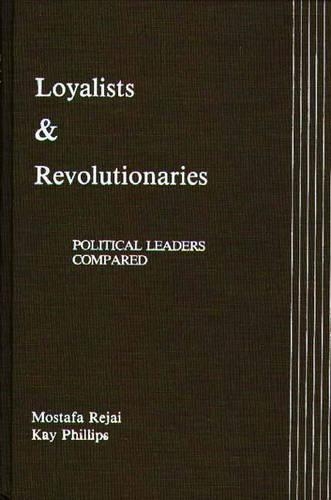
Loyalists and Revolutionaries: Political Leaders Compared
(Hardback)
Publishing Details
Loyalists and Revolutionaries: Political Leaders Compared
By (Author) Mostafa Rejai
By (author) Kay Phillips
Bloomsbury Publishing PLC
Praeger Publishers Inc
21st April 1988
United States
Classifications
Tertiary Education
Non Fiction
303.34
Physical Properties
Hardback
214
Description
What motivates political leaders to seek office What social backgrounds do political leaders exhibit Are all leaders fundamentally alike or do we find important differences between them These and related questions concerning political leadership are examined in this unique new work. The authors concentrate on two principal types of political leaders: Loyalists, those who seek office through peaceful processes, whether appointive or elective; and Revolutionaries, those who seize power in violent ways. By systematically comparing the similarities and differences between these two groups, Rejai and Phillips find that Loyalists and Revolutionaires are basically the same type of person. However, their most significant differences lie in their relative access to positions of power and authority within their respective societies.
Reviews
An interesting, concise analysis of the differences between political elites or leaders who are "loyalists" and those who are "revolutionaries." The authors, academic social scientists, attempt to differentiate among those who come to power through peaceful processes and those who seize power--or attempt to do so--through violence. For this, they chose 50 matched pairs of elites from a wide variety of political systems around the world and subjected their lives and their backgrounds to intense, social, economic, and psychological scrutiny. The results are surprising from the perspective of conventional political commentary, which tends to see loyalists as stable and respectable and revolutionaries as zealots and outcasts. The findings show few differences between the two groups. What is most notable is the similarity between them. It will be valued by other social scientists, especially by students of revolution.-Choice
"An interesting, concise analysis of the differences between political elites or leaders who are "loyalists" and those who are "revolutionaries." The authors, academic social scientists, attempt to differentiate among those who come to power through peaceful processes and those who seize power--or attempt to do so--through violence. For this, they chose 50 matched pairs of elites from a wide variety of political systems around the world and subjected their lives and their backgrounds to intense, social, economic, and psychological scrutiny. The results are surprising from the perspective of conventional political commentary, which tends to see loyalists as stable and respectable and revolutionaries as zealots and outcasts. The findings show few differences between the two groups. What is most notable is the similarity between them. It will be valued by other social scientists, especially by students of revolution."-Choice
Author Bio
MOSTAFA REJAI is Distinguished Professor in the Department of Poitical Science at Miami University, Oxford, Ohio. KAY PHILLIPS is Professor of Sociology and Anthropology and Associate Provost at Miami University, Ohio.
